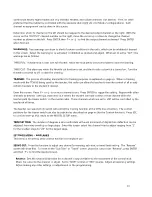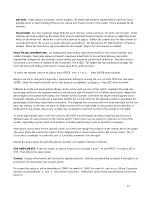
GYRO MIXING:
This function is for setting and switching the sensitivity of an optional gyro. Enter this screen.
To make the gyro mixing active at all times do NOT assign a switch at the CTRL line. Press ENTER to highlight the
normal mixing rate, and press
↑
+ or
↓
- to find the desired value. Press ENTER when finished.
To control the mix with a switch, move the cursor to the CTRL line and press ENTER. Deflect the desired switch to
control the mix. The screen will show the functional assignments for each position of the switch (see page xx for
details). Press ESC to confirm the switch selection.
The display will now show the different switch positions (SP.0, SP.1, SP.2). A different gyro mixing rate can be set
for each switch position. Deflect the switch to one position and note the cursor on-screen will automatically move
to the percentage for that position. Adjust the rate as desired and press ENTER when finished. Deflect the switch
to the remaining positions and repeat.
To clear a switch was set to control the mix or hold, highlight the switch and press CLEAR.
SWASH MIXING:
This mix is not available when using the "1 Servo" swash setting. This function adjusts the
mixture rate of the pitch, aileron, and elevator channels for the swash plate. Move the cursor to the value to
adjust, and change as necessary.
THROTTLE MIXING:
When a helicopter's aileron, elevator, and tail controls are moved, the movement of the
swash plate can affect the RPM of the engine/motor. This throttle mix can offset that effect.
To mix the aileron, elevator, and/or rudder channels to the throttle channel and leave the mix active at all times,
do not set a control switch on the CTRL line like shown above left. Move the cursor to select which channel to mix
to the throttle channel, press ENTER and then
↑
+ or
↓
- to adjust the value.
A switch can be assigned at the CTRL line to change between different mixture rates. Once a switch is selected,
move the switch to each position, then use
↑
+ or
↓
- to move the cursor to the individual percentages and adjust
as desired.
If mixing the rudder channel to the throttle, set the mix value as a positive value such as "+17%" if the main rotor
turns
clockwise
if looking down on the rotor from above. If the main rotor turns
counter-clockwise
, set the mix
value as a negative value such as "-29%".
To reset any mix value or clear a switch selection, move the cursor to the value, press ENTER, and then press
CLEAR.
RUDDER MIXING:
This function is helpful if using a gyro that does not have the heading-hold function. Much
like throttle mixing, the aileron and/or elevator channels can be mixed to the rudder channel. If the helicopter's
main rotor turns clockwise when looking down on the rotor from above, set a positive mix value such as "+35%".
If the main rotor turns counter-clockwise, set a negative mix value such as "-41%".
Setting of the rudder mix uses the same method as the throttle mix as explained above.
SWASH RING:
Depending on how certain mixes are set and mechanical linkages are connected to the swash
plate, it's possible that the mechanical connections can accidentally be damaged or dislodged if they are forced to
try and move past their own limitations. By adjusting the maximum amount of travel the aileron and elevator
21
























